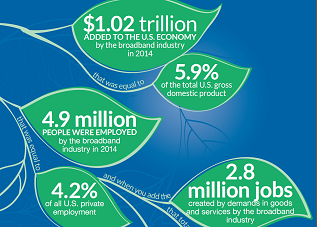Study Says Broadband Is $1 Trillion Econ Driver
The smarter way to stay on top of the multichannel video marketplace. Sign up below.
You are now subscribed
Your newsletter sign-up was successful

The U.S. broadband and ICT sectors have generated over a trillion dollars in annual value to the U.S. economy, according to an economic analysis commissioned by the Internet Innovation Alliance.
The study concludes that all that activity was generated thanks to an "environment of light federal regulation." And while the study authors say they don't know how the FCC's Title II reclassification of ISPs will affect economic growth and employment, they predict from former analysis and review of the literature and history that it could adversely affect broadband/ICT investment and have "significant secondary costs" for other industries.
Among the takeaways are that $1,019.2 billion in value added, or 5.9% of U.S. GDP, employing almost 5 million workers (full time or full time equivalent), and average salaries across the sector of $104,390, or 59.3% of the average national wage of $65,517.
“Today, high-speed Internet is the backbone for 21st century economic growth in the digital economy,” said Rick Boucher, honorary IIA chair and the former non-honorary Democratic chair of the House Telecommunications Subcommittee. “Unnecessary price regulation in competitive broadband markets will have far-reaching negative impacts on U.S. economic growth and development.
The smarter way to stay on top of the multichannel video marketplace. Sign up below.
Contributing editor John Eggerton has been an editor and/or writer on media regulation, legislation and policy for over four decades, including covering the FCC, FTC, Congress, the major media trade associations, and the federal courts. In addition to Multichannel News and Broadcasting + Cable, his work has appeared in Radio World, TV Technology, TV Fax, This Week in Consumer Electronics, Variety and the Encyclopedia Britannica.

